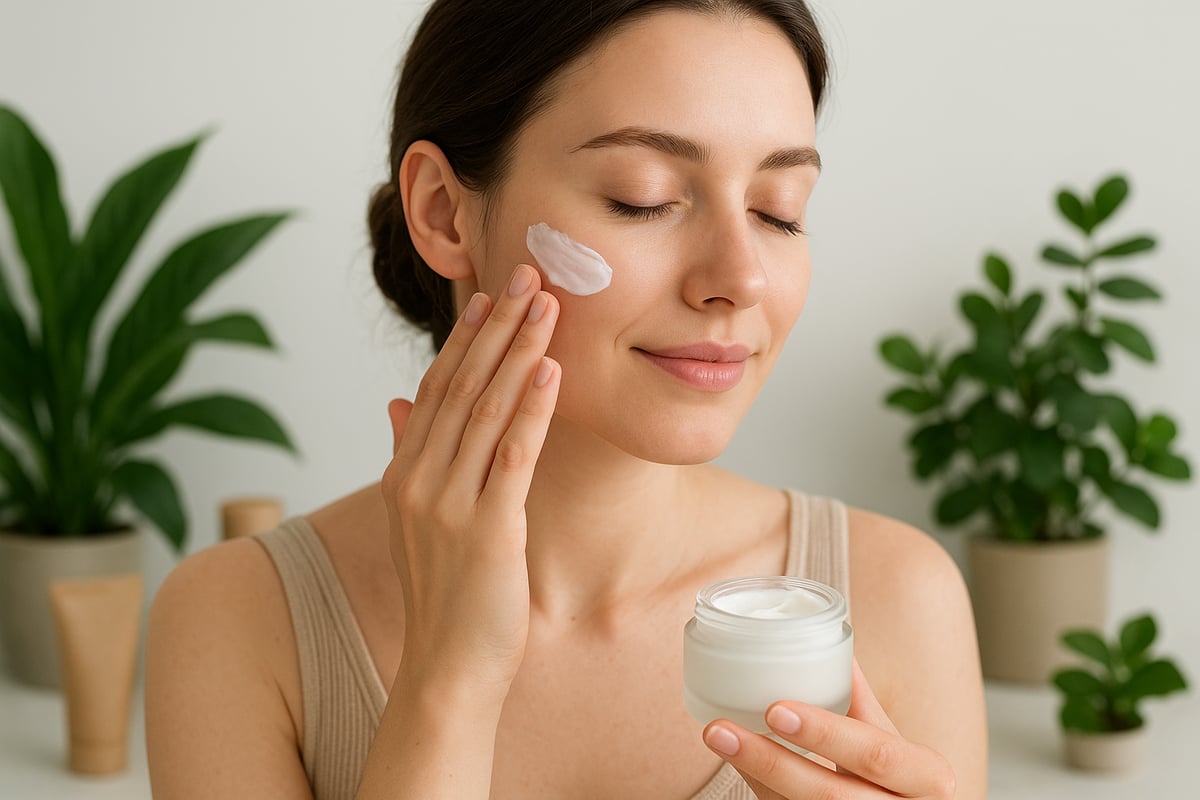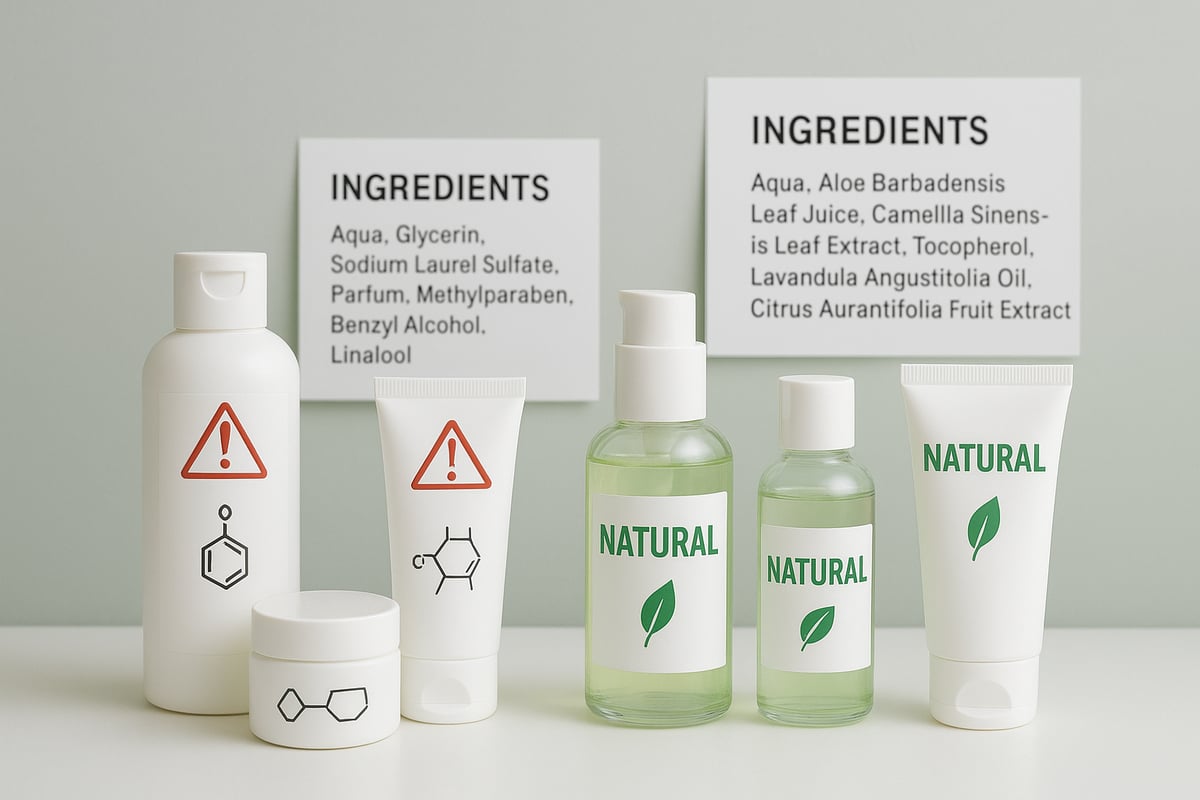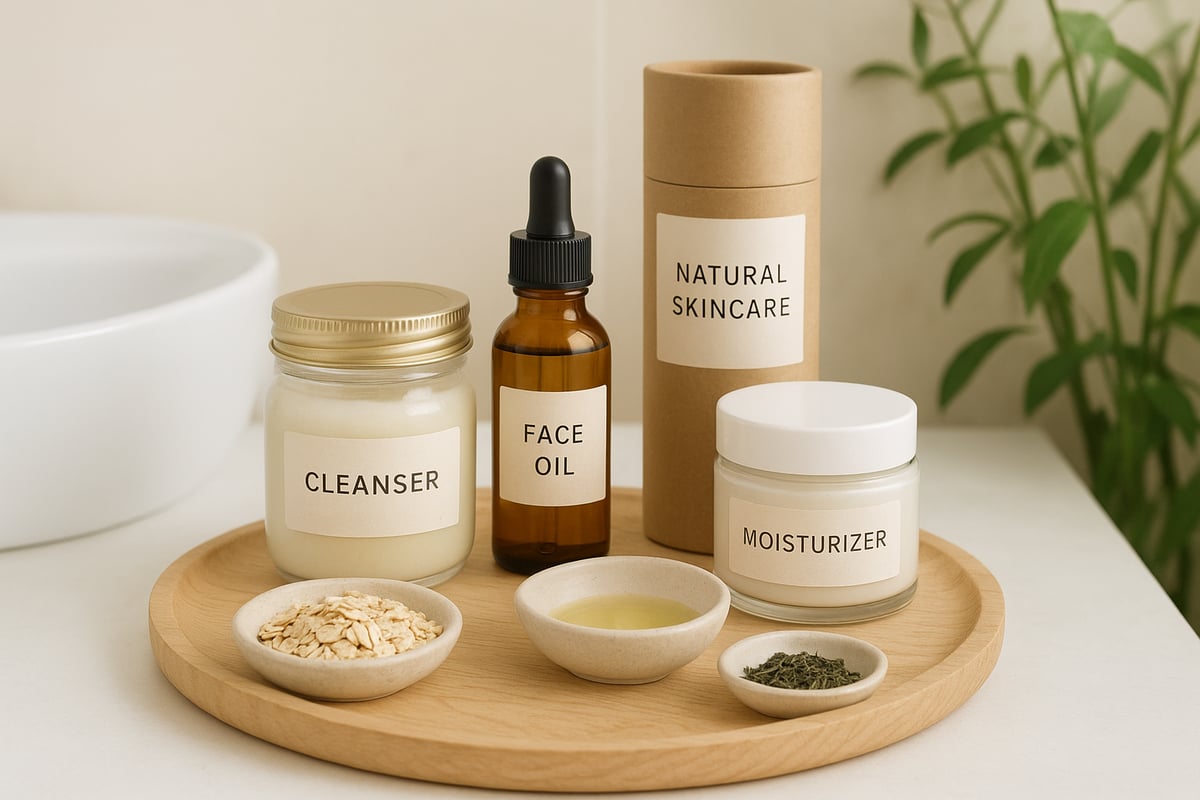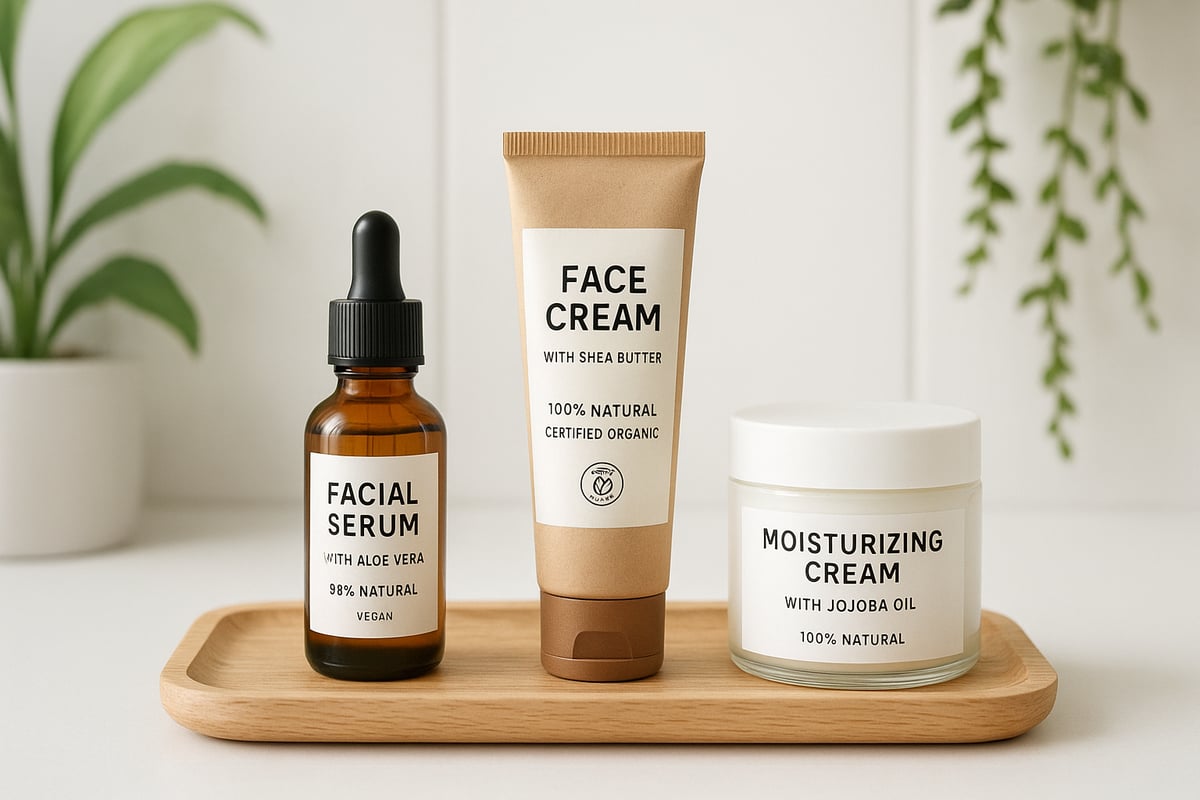More and more Swedes want skin care that takes both health and the environment into account. But how can you be sure that your daily routine is free of harmful ingredients?
This guide provides concrete advice on how to create an effective and sustainable skincare routine. We show how natural, chemical-free skincare can protect both your skin and the planet by 2025.
Here you will learn why natural ingredients are important, which substances you should avoid, how to interpret ingredient lists and choose the right products. Get inspiration and knowledge for skin care that delivers results, without compromise.
Why Choose Natural Skin Care Without Chemicals?
Choosing natural skin care without chemicals has become an important issue for many Swedes. Awareness of how the skin is affected by various substances is increasing, and more people want to protect both themselves and the environment. But why is this choice so crucial for the future?

The role of the skin and its sensitivity to chemicals
The skin is the body's largest organ and acts as a barrier to the outside world. It protects us from bacteria, pollution and dehydration. But the skin is also sensitive to chemicals that can penetrate and disrupt its natural balance.
Contact with certain synthetic substances can lead to irritation, allergic reactions or even hormonal disruptions. Statistics from Swedish authorities show a clear increase in skin-related allergies in recent years. Choosing natural skin care without chemicals reduces the risk of negative reactions and strengthens the skin's protective function.
Benefits of natural ingredients
Natural ingredients are often more biocompatible with the skin than synthetic alternatives. They contain nourishing oils and extracts, such as almond oil and oat extract, which are known for their soothing and moisturizing properties. Many natural products are also vegan, cruelty-free, and contribute to more sustainable consumption.
If you want to delve deeper into the benefits and get tips on how to choose the right products, please read Natural skin care – tips and advice . By investing in natural skin care without chemicals, you get both a healthy and environmentally friendly choice for your daily routine.
Environmental aspects and sustainability
Chemicals in skin care products can end up in drains and negatively impact aquatic environments. They contribute to pollution that harms ecosystems and aquatic organisms. Natural skin care products are often biodegradable and have a significantly lower environmental impact.
Packaging choices also play an important role. Glass and recycled plastic are better alternatives to single-use plastic. When you choose natural skin care without chemicals, you are making an active choice for both your own future and the planet's.
Consumer health and long-term effects
Long-term exposure to certain chemicals has been linked to hormone disruption and other serious health risks. Research from European authorities specifically points to parabens and phthalates as substances to avoid in skin care.
Switching to natural, chemical-free skincare is a way to minimize these risks and take control of what you put on your skin every day. It gives you peace of mind and supports a sustainable lifestyle with a focus on long-term health.
Trends 2025: Increased focus on transparency
Ahead of 2025, there is a clear trend where consumers are demanding transparency about content and origin. According to statistics, 65 percent of Swedes want a complete list of ingredients and clear origin labeling on their skincare products.
This transparency makes it easier to choose natural skin care without chemicals and avoid hidden risks. Companies that invest in clear information and sustainable ingredients are at the forefront and meet consumers' increasing demands for responsibility.
Chemicals to Avoid in Skincare in 2025
Choosing natural, chemical-free skincare requires that you be aware of which substances can be harmful to your skin and the environment. Many ingredients in conventional products have been shown to cause allergies, irritation or long-term health problems. Below we go over the most important chemicals to avoid, how they are listed, what regulations apply and what you can choose instead.

Common harmful substances and their effects
In natural, chemical-free skincare, you should be wary of parabens, synthetic fragrances, silicones, sulfates, phthalates, and petrochemicals. Parabens are used as preservatives but have been linked to hormone disruption. Synthetic fragrances can cause allergic reactions and asthma, while silicones clog pores and are difficult to break down in the environment. Sulfates dry out the skin and disrupt the skin barrier. Phthalates and petrochemicals are linked to hormone disruption and environmental problems.
Research shows that contact allergies linked to skin care products are increasing. Read more about the risks in Research on skin care products and contact allergies . By choosing natural skin care without chemicals, you reduce the risk of reactions and long-term health problems.
How chemicals are listed on packaging
When looking for natural, chemical-free skin care, it’s important to understand how ingredients are listed. Packaging uses the INCI system, which lists ingredients in English or Latin. Some chemicals can be hidden under names like “Parfum,” “PEG,” or “Dimethicone.” These names make it harder to determine what the product actually contains.
Learn to interpret ingredient lists and pay special attention to substances that are often found in conventional products. If you are unsure about an ingredient, research it or choose products with full transparency about its contents. This way, you can make a safer choice for natural skin care without chemicals.
Current regulations and labeling 2025
In 2025, new EU regulations came into force to protect consumers and the environment from harmful chemicals in skin care. Certifications such as COSMOS, Ecocert, Swan and Vegan Society help you choose natural skin care without chemicals. These labels guarantee that the products meet strict requirements for ingredients, production and environmental impact.
Table: Examples of markings
| Marking | Focus area | Requirements for chemicals |
|---|---|---|
| COSMOS | Natural/Organic | No synthetic preservatives |
| Ecocert | Organic | Strict ingredient requirements |
| The Swan | Environment | Low environmental impact |
| Vegan Society | Vegan | No animal ingredients |
Choose products with clear certifications to ensure you get natural skin care without chemicals.
Statistics and consumer data
Interest in natural skin care without chemicals is steadily increasing in Sweden. According to statistics from 2024, 72% of Swedes want to avoid parabens and synthetic fragrances in skin care. In 2023, more than 4,000 products were recalled in the EU due to harmful substances.
Consumers are demanding greater transparency and want to see full ingredient lists and labels on packaging. This trend is driving manufacturers to invest more in natural skin care without chemicals and clear information.
Examples of natural alternatives
There are several natural alternatives to conventional chemicals in skin care. Natural preservatives such as vitamin E and rosemary extract replace parabens. Plant-based fragrances, such as essential oils, can be used with caution instead of synthetic perfumes.
To achieve natural skin care without chemicals, aloe vera, plant glycerin and fermented hyaluronic acid are also recommended. By choosing these options, you can create a skin care routine that is gentle on both the skin and the environment.
How to Build a Natural Skincare Routine – Step by Step
Creating a natural, chemical-free skincare routine doesn't have to be complicated. By following a few simple steps, you can give your skin the best possible conditions for balance and health. Below, we'll guide you step by step towards a skincare routine that's both gentle and effective.

Step 1: Cleaning
Cleansing is the foundation of all natural, chemical-free skincare. Choose products without sulfates and synthetic surfactants, and instead use oat or aloe vera-based products. These ingredients gently cleanse without drying out or disrupting the skin's balance.
For those with sensitive skin, it is especially important to avoid fragrances and strong preservatives. Many people experience reduced irritation when they choose natural skin care without chemicals from the very first step. If you want to know more about gentle cleansing, we recommend Skin Care for Sensitive Skin where you will get tips on products and routines.
- Choose a gentle facial cleanser with oats or aloe vera
- Avoid added fragrances and aggressive detergents
- Adapt cleansing to your skin type
By prioritizing natural skin care without chemicals in your cleansing routine, you are laying the foundation for healthy skin.
Step 2: Hydration
After cleansing, it's time to moisturize your skin. Opt for creams and lotions that contain natural oils like almond, jojoba or shea. Plant-based glycerin and fermented hyaluronic acid help to bind moisture deep down.
Natural, chemical-free skincare means avoiding mineral oils and synthetics that can clog pores. An organic face cream with Swedish oats is both nourishing and soothing – perfect for daily use.
- Use moisturizer with natural oils
- Choose ingredients that bind moisture, such as vegetable glycerin and hyaluronic acid
- Adjust amount according to season and skin type
Regular hydration with natural skin care without chemicals strengthens the skin barrier and gives it radiance.
Step 3: Nourishment and protection
The next step in your natural, chemical-free skincare routine is to add nourishment and protection. Serums and oils with antioxidants like vitamin C, vitamin E, and vitamin A help skin resist external stressors.
For sun protection, choose products with zinc oxide or titanium dioxide without nanoparticles. These natural filters protect without clogging pores. Feel free to supplement with ingredients like algae extract and green tea for protection against blue light and pollution.
- Apply serum or oil with antioxidants
- Use natural sunscreen daily
- Protect against environmental influences with green tea extract or algae
Natural skin care without chemicals contributes to long-term protection and vitality.
Step 4: Special care
Sometimes your skin needs extra care. Special care in natural, chemical-free skincare can include spot treatments with tea tree oil, lavender, or naturally derived niacinamide.
For a deeper treatment, you can use masks with clay, honey or probiotics. These ingredients balance, soothe and strengthen the skin without unnecessary additives.
- Spot treatment with natural extracts
- Use a face mask 1–2 times a week
- Vary the special care as needed
Special care deepens the effect of natural skin care without chemicals and makes the routine complete.
Step 5: Adapt to skin type and season
One of the biggest benefits of natural, chemical-free skincare is the ability to customize your routine. Dry skin benefits from extra oils and thicker creams, while oily skin thrives on lightweight gels and aloe vera.
During the winter you may need more nourishment and protection, while summer calls for lighter products and more focus on sun protection. Listen to your skin and adjust according to the season and your mood.
- Dry skin: More oil, fattier creams
- Oily skin: Light products, aloe vera, hemp seed oil
- Winter/summer: Adjust quantity and type of products
By adjusting your natural skin care without chemicals, you will get the best possible results all year round.
Example of complete routine
To make it easy to get started with natural skin care without chemicals, here is a concrete example of a daily routine:
Morning:
- Cleaning with mild product
- Serum with antioxidants
- Day cream with natural oils
- Natural sun protection
Evening:
- Cleaning
- Facial oil or nourishing serum
- Night cream with soothing ingredients
Following such a natural skin care routine without chemicals provides skin with 24/7 support.
Tips for transitioning to natural skin care
Switching to natural, chemical-free skincare can take some patience. Start with one product at a time to reduce the risk of reactions and let your skin adjust.
Please document your experience and follow up on changes in your skin. Adjust as needed and remember that results sometimes take time.
- Gradually replace products
- Write down results and reflections
- Consult a dermatologist if necessary.
A thoughtful transition to natural skin care without chemicals provides long-term benefits for both skin and the environment.
How to Choose the Right Natural Skincare Products
Finding the right products for natural skin care without chemicals requires knowledge and accuracy. As interest increases, it is becoming increasingly important to be able to distinguish between genuine natural alternatives and products that are only marketed as green. Here you will get concrete advice to make smart and safe choices.

Read and understand the ingredient list
Reading and interpreting the ingredient list is essential when choosing natural, chemical-free skincare. Look for short lists that feature plant-based ingredients high up. Avoid names that end in “-cone,” “-paraben,” “PEG,” or hidden terms like “Parfum.”
Be wary of greenwashing, where companies market products as natural despite synthetic additives. The term “natural” is not always regulated, making it important to check the content yourself. For a more in-depth review, please read Organic Skincare – What Should You Consider? where you will learn the difference between organic and natural skin care.
Keep in mind that natural skin care without chemicals is based on transparency and clarity in ingredient choices.
Certifications and labels to trust
Certifications are an effective support when you want to ensure that you are buying natural skin care without chemicals. Some of the most reliable labels are COSMOS, Ecocert, Svanen and Vegan Society. These certifications set requirements for both content and environmental responsibility.
| Certification | Focus area | Famous symbols |
|---|---|---|
| COSMOS | Naturalness, ecology | Flower, “COSMOS” |
| Ecocert | Organic, sustainable | Leaf, “Ecocert” |
| The Swan | Ecolabelling | The Swan |
| Vegan Society | Animal-friendly, vegan | Sunflower |
Understanding what the symbols mean will help you make informed choices in natural skin care without chemicals.
Quality and origin
The quality of natural, chemical-free skincare is affected by its origin. Products made in Sweden or Europe are often subject to stricter laws and better traceability. It is wise to choose brands that are transparent about where the ingredients come from and how they are processed.
Ask about the country of origin and production methods of the ingredients. Many reputable companies publish details about origin and sustainability on their websites. By prioritizing transparency, you will have a safer and more sustainable skincare routine.
Natural skin care without chemicals is as much about quality and responsibility as it is about results.
Product tests and reviews
Reading independent tests and verified reviews is crucial to finding the best natural, chemical-free skin care. Many consumers trust other people's experiences more than advertising. Look for tests from credible sources and take note of reviews about effectiveness, feel, and scent.
According to surveys, 80 percent of Swedes highly value verified reviews when choosing a skin care product. Combine this with your own skin type and needs to make the right choice. Remember that natural skin care without chemicals can give different results depending on the sensitivity of the skin.
Examples of natural favorites
There are several popular products for natural skin care without chemicals on the Swedish market. Common favorites are face cream with oats and almond oil, organic body soap with yuzu and thistle, and serum with fermented hyaluronic acid.
One example is Éclore, which offers a wide range of natural skincare products based on plant ingredients and free of harmful chemicals. The products are made in Europe with a focus on quality, sustainability and everyday luxury.
By trying out carefully selected products, you can find a routine that suits you and your view of natural skin care without chemicals.
Natural Ingredients to Invest in in 2025
Choosing the right ingredients is key for those who want natural skin care without chemicals. Several plant-based substances have proven to be extra effective for skin health while also being gentle on the environment and the body. Here we review the most important oils, extracts and vitamins to invest in in 2025.
Oils and fats
Oils and fats from the plant kingdom are the basis of many products for natural skin care without chemicals. Almond oil moisturizes, protects and nourishes the skin. Jojoba oil resembles the skin's own sebum and balances sebum production. Shea butter is rich in fatty acids and provides deep-acting moisture, especially for dry skin.
A comparison in tabular form:
| Oil/Grease | Property | Skin type |
|---|---|---|
| Almond oil | Moisturizing | Dry, sensitive |
| Jojoba oil | Balancing | Oily, combination skin |
| Shea butter | Deep moisture, protection | Very dry |
These oils are easily absorbed and are suitable for most people looking for natural skin care without chemicals.
Plant extracts and herbs
Plant extracts have become increasingly important in natural, chemical-free skin care. Oat extract soothes and moisturizes, while green tea is a powerful antioxidant and protects against free radicals. Chamomile and lavender reduce irritation and redness, making them excellent for sensitive skin.
Using plant extracts daily can strengthen the skin barrier and contribute to a more even skin tone. The combination of these herbs provides both care and protection, making them an obvious choice for those who want a sustainable routine.
Natural humectants and vitamins
Humectants and vitamins are essential for those looking for natural, chemical-free skincare. Plant-based glycerin deeply locks in moisture, and fermented hyaluronic acid provides long-lasting hydration. Vitamins like C and E have antioxidant properties and help even out skin tone.
According to The Science Behind Organic Skincare, research supports that natural ingredients can truly improve skin quality with regular use. Together, these substances provide skin with vitality and protection.
Raw materials from the Nordic countries
Nordic raw materials are a treasure trove of natural skin care without chemicals. Blueberries, lingonberries and sea buckthorn are rich in vitamins, antioxidants and fatty acids. These berries protect the skin against external stress and contribute to radiance. Many Swedish brands highlight these ingredients in their products.
Choosing products with Nordic ingredients not only means effective skin care, but also a sustainable choice with shorter transport distances and traceability. It's a smart way to combine quality with environmental responsibility.
Avoid potential allergens
Natural, chemical-free skin care also means being vigilant about natural substances that can cause irritation. Essential oils can be potent allergens, especially in high concentrations. If you have sensitive skin, choose products with mild ingredients and avoid strong fragrances.
Always test new products on a small area of skin first. Being aware of possible allergens will help you have a safer and more balanced skincare routine. Natural, chemical-free skincare is about choosing with care for both your skin and your health.
Myths and Facts about Natural Skin Care
Choosing natural, chemical-free skincare may seem obvious, but there are many misconceptions about what is actually natural and how effective it is. Many people believe that natural is always better for the skin and the environment, but the truth is more nuanced. To help you navigate the jungle of products and claims, we're clearing up the myths and facts about natural, chemical-free skincare.
Common misconceptions
A common myth is that natural, chemical-free skincare is always kind to the skin. In fact, even natural ingredients can cause allergies or irritation, especially if used in high concentrations. Another misconception is that organic means completely chemical-free, but even natural products sometimes need preservatives to be safe. Finally, some people believe that natural, chemical-free skincare doesn’t work, but studies have shown that regular use can improve both skin quality and comfort.
Research and scientific findings
The science surrounding natural, chemical-free skincare has grown in recent years. Several studies show that ingredients like almond oil, oat extract, and green tea have documented positive effects on skin health. Statistics from 2024 show that 70% of consumers experience improved skin quality when switching to natural products. For more information on how chemicals in skincare affect health, see the Environmental Health Report 2021 from the Swedish Public Health Agency .
Difference between natural, organic and vegan
It's important to understand the difference between different labels when choosing natural, chemical-free skin care. Below is a comparison of the three most common terms:
| Marking | What it means |
|---|---|
| Natural | Contains mainly ingredients from nature |
| Organic | Raw materials grown without synthetic pesticides |
| Vegan | Contains no animal ingredients or by-products |
Reading up on labels helps you make informed choices and avoid greenwashing.
Tips for avoiding pitfalls
To succeed with natural skin care without chemicals, always check the ingredients list, even on products that are marketed as natural. Ask for laboratory and dermatological tests for extra safety. Ask the manufacturer about origin and sustainability. Feel free to read guides like Natural Glow Without Makeup for tips on how to get the best results and avoid common mistakes.
- Check tables of contents
- Seek independent testing
- Choose certified products
Being careful reduces the risk of unexpected skin reactions and disappointments.
The future of natural skincare
Innovation in biotechnology and fermentation is opening up new possibilities for natural, chemical-free skincare. The products of the future will be even more customized and sustainable, with smart packaging and increased transparency around the origin of ingredients. Consumer demands for clarity and quality are driving this development, increasing the security of choosing natural, chemical-free skincare.
Now that you’ve gained insight into why natural, chemical-free skincare is so important and how you can build a healthy routine with sustainable, carefully selected ingredients, you may be curious to take the next step. Whether you’re looking for everyday luxury or want to nourish and balance your skin, you can find products that match your values and needs. Want to see what natural alternatives are out there and discover new favorites for your skincare routine in 2025?
See our range


